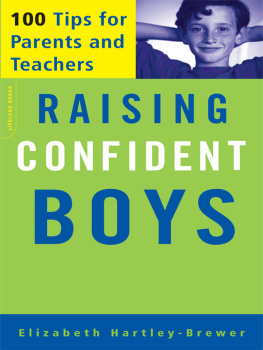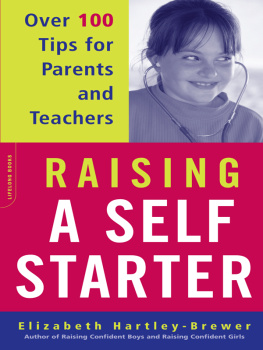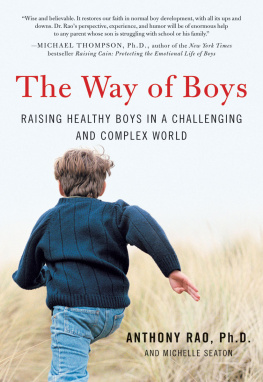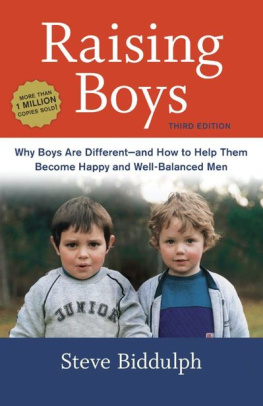As someone, clearly, with no direct experience of being male, Ive had to check things out with a number of boys and male friends and colleagues. Ive also had help from teachers who work closely with boysand girlsat the educational frontier to give them meaning, respect and personal fulfillment.
I would like, then, to thank Dexter Hutt, Principal of Ninestiles School in Birmingham, and Gary Wilson, Head of English at Newsome High, Huddersfield, both of whom gave precious time to conversations and manuscript reading, not to forget their children who had to do without their attention at these times. I would also like to thank Geoff Evans, of the Cmon Everybody project; George Hosking, who works with young violent men to help them understand and calm their souls; Adrienne Katz, who founded the research organization Young Voice, through which growing boys and girls have been able to speak and be heard; Dr. Sebastian Kraemer for his paper, The Fragile Male, and for responding so promptly to my e-mails; and Joanne Edelman, friend and mother of two boisterous growing boys.
The idea for this book came from Jacqueline Burns, my editor. Had she not been such fun to work with, I would not have written it. I am very grateful to her, for I have learned much in the process. Finally, I thank my son, Stephen. It has been a real privilege to be his mother. I wish him every happiness as he leaves his teens and embarks on adulthood.
CHAPTER 1
Understanding His Challenges and Opportunities
Boys are in the news as having a hard time at the moment.They seem to be struggling, finding it harder and harder to succeed, conform and find a comfortable role in life.Statistics tell us that boys experience more behavioral problems; get involved in more crime and at a younger age; are losing the academic edge they once held over girls; and demonstrate their despair in significantly higher suicide rates than girls. Social, economic and even educational changes seem to be undermining their essential manhood, and some see the future as promising little but constant pressure or failure, or both. Their self-esteem and motivation appear to be at rock bottom.
However, many boys continue to do exceptionally well and enjoy greater freedom, having thrown off the chains of only one vision of masculinity. They thrive on the challenge of living in this new world and find comfort in the permission to think, feel and act in tune with the warm heart within them.
Boys are lovable, amusing, destructive, proud and defiant. They come in all possible shapes and sizes. Evidence is mounting that their brains as well as their bodies are different from girls. It matters a lot how they grow up and how much respect society and families give them. It really matters, too, that they dont see education as an all-female province. It is crucial that they are allowed to respond to their male instincts within an understanding environment, so that they may feel true to themselves without following images of manhood that will lead them into trouble. Boys need just as much love, care and attention as girls in order to become lovable, loving, resilient and well-rounded adults who can make the most of life. Boys positive self-confidence must derive not only from being happy to be male and having a clear idea of what manhood means, but also from a secure sense of who they are.
Boys are half our future. Given the changes taking place in society, particularly in employment and the family, growing boys will naturally feel confused and uncertain about the future. For instance, what does fatherhood mean? How important are commitment and marriage?How should they manage their sometimes contradictory feelings of sadness, anger, tenderness, competitiveness and protectiveness? Yet, while these changes may be disturbing, they are also potentially liberating, for they offer boys more ways of being themselves and therefore more ways to strengthen their self-confidence.
In the future, parents and teachers may need to give boys more support and guidance as they navigate their way around the increasing choices facing them. Instead of being able to slip effortlessly into a preset stereotype, boys must look to what lies inside them and experiment with ways to express and develop the threads of self that are woven into the fabric of character. As self-knowledge increases, self-confidence deepens.
Boys now stand at a crossroad. They can choose a path leading to diminishing opportunities and greater self-doubt, or one toward self-development and deeper self-worth.Which route they choose will depend on the quality of their self-esteem.
When a boy has a good relationship with an adult who makes him feel understood, valued and wanted; when he feels supported so that he does well in school, becomes competent and confident; and, through his various interests, gains several reliable groups of friends with whom he learns to socialize and work out differences, he learns to face the future with confidence and courage. It is vital for his mental health that he avoids becoming isolated and sullen, for a world without others easily becomes peopled by personal demons.
Industrial buildings that house hazardous chemicals carry a warning sign on their walls. Parents should take equal heed when they see their son carrying a label with the three Is: Isolation, Insecurity and Insignificance.These Is are explosive and create an emotional cocktail that can damage someone for a lifetime.
Internal strength is the antidote for these corrosives. In the past, boys had to toughen up emotionally and physically. Partly for survival on the battlefield, skins were thickened and upper lips stiffened, often through bullying, to condition men to hide feelings that could let their country down. Resilience is, undoubtedly, important, but boysand girls tooalso need to be flexible, to be able to regenerate themselves after setbacks, and to develop what we might call emotional courage.











